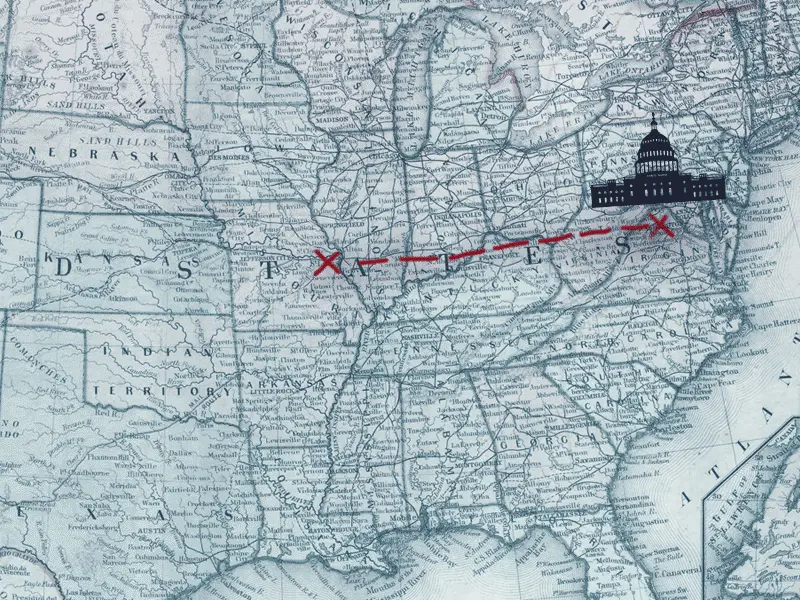Congress
What the Inflation Reduction Act Hopes to Do About Climate Change
The spending bill aims to spur investment in renewable energy and slash greenhouse gas emissions
The Story Behind One of the Most-Mocked Paintings in U.S. History
Long ridiculed, the Howard Chandler Christy artwork of the signing of the U.S. Constitution shows democracy at its most realistic
A Brief History of Televised Congressional Hearings
From a 1951 investigation into organized crime to the Watergate scandal, the ongoing January 6 hearings are part of a lengthy political tradition
All-Black, All-Woman WWII Unit Awarded Congressional Gold Medal
The 6888th Central Postal Directory Battalion cleared a six-month backlog of mail while stationed in Europe in 1945
What Happened the Last Time the U.S. Tried to Make Daylight Saving Time Permanent?
A 1974 switch to year-round DST proved unpopular, with Americans expressing "distaste" for the long, dark winter mornings
How Sitting Bull's Fight for Indigenous Land Rights Shaped the Creation of Yellowstone National Park
The 1872 act that established the nature preserve provoked Lakota assertions of sovereignty
Artist Wins Legal Battle With Post Office Over Custom Postage Stamp
Federal judge cites violation of First Amendment by USPS in deciding not to print custom postage for customer that contained a political message
For Harry Houdini, Séances and Spiritualism Were Just an Illusion
The magician spent years campaigning against fraudulent psychics, even lobbying Congress to ban fortune-telling in D.C.
This Civil War–Era Eagle Sculpture Was Made Out of Abraham Lincoln's Hair
The unusual artifact also contains tresses from First Lady Mary Lincoln, members of the president's cabinet and senators
The Ill-Fated Idea to Move the Nation's Capital to St. Louis
In the years after the Civil War, some wanted a new seat of government that would be closer to the geographic center of a growing nation
Curators Seek $25,000 to Repair Artworks Damaged in U.S. Capitol Attack
Rioters vandalized six sculptures and two paintings, in addition to smashing windows, breaking furniture and spraying graffiti
Memorial to Civil Rights Icon John Lewis Will Replace Confederate Monument in Georgia
A tribute to the congressman and activist will stand in a DeKalb County square once occupied by a Confederate obelisk
The History of Violent Attacks on the U.S. Capitol
While the building has seen politically motivated mayhem in the past, never before has a mob of insurrectionists tried to overturn a presidential election
Meet Joseph Rainey, the First Black Congressman
Born enslaved, he was elected to Congress in the wake of the Civil War. But the impact of this momentous step in U.S. race relationships did not last long
Congress Approves Smithsonian Museums Honoring Women and Latino Americans
The legislative body's year-end spending bill authorized the creation of two much-anticipated museums
How John Adams Managed a Peaceful Transition of Presidential Power
In the election of 1800, for the first time in U.S. history, one party turned the executive office to another
How Young Activists Got 18-Year-Olds the Right to Vote in Record Time
In 1971, more than 10 million 18– to 20-year-olds got the right to vote thanks to an amendment with bipartisan support
A Brief History of Astronauts in Congress
This year, Arizona elected Mark Kelly to the Senate, making him the fourth astronaut elected to Congress
When Opera Star Jenny Lind Came to America, She Witnessed a Nation Torn Apart Over Slavery
Born 200 years ago, the Swedish soprano embarked on headline-grabbing tour that shared the spotlight with a political maelstrom
Why Thomas Jefferson Created His Own Bible
In a new book, Smithsonian curator of religion Peter Manseau tells of how <em>The Life and Morals of Jesus of Nazareth</em> first sparked hot controversy
Page 2 of 4
:focal(960x640:961x641)/https://tf-cmsv2-smithsonianmag-media.s3.amazonaws.com/filer_public/76/44/764400bb-e0b1-4bdb-aac3-d8afc88fbb9a/industry-1761801_1920.jpg)
:focal(400x301:401x302)/https://tf-cmsv2-smithsonianmag-media.s3.amazonaws.com/filer_public/40/d6/40d6724d-c63d-4525-ace0-3c78c1a4fc74/3.jpg)
:focal(2188x1247:2189x1248)/https://tf-cmsv2-smithsonianmag-media.s3.amazonaws.com/filer_public/fb/7f/fb7f92e8-7677-478f-bd29-17b2b624779a/gettyimages-515335156.jpg)
:focal(696x537:697x538)/https://tf-cmsv2-smithsonianmag-media.s3.amazonaws.com/filer_public/13/a8/13a888d0-0ced-41c3-ac31-5cc2cd081d75/dyljcdixgaelsyj.jpg)
:focal(700x527:701x528)/https://tf-cmsv2-smithsonianmag-media.s3.amazonaws.com/filer_public/65/e4/65e4929e-2d1b-46d6-85a6-cda4649621e7/clocks.jpg)
:focal(960x367:961x368)/https://tf-cmsv2-smithsonianmag-media.s3.amazonaws.com/filer_public/d2/12/d2125c70-666d-4baf-889e-6c4e2ffd993a/sitting_bull.jpg)
:focal(2125x1356:2126x1357)/https://tf-cmsv2-smithsonianmag-media.s3.amazonaws.com/filer_public/cd/29/cd29729b-2aff-4ca4-a72f-89cdd80a97ea/protest_of_citizens_united_in_dc.jpg)
:focal(713x327:714x328)/https://tf-cmsv2-smithsonianmag-media.s3.amazonaws.com/filer_public/fe/f8/fef899d3-ffbc-41de-8ebe-9e8f807ec361/testing.jpg)
:focal(640x520:641x521)/https://tf-cmsv2-smithsonianmag-media.s3.amazonaws.com/filer_public/9e/ed/9eed95b8-725c-4dda-84a5-a56123265d0f/hairyeagle.jpg)

:focal(1846x1687:1847x1688)/https://tf-cmsv2-smithsonianmag-media.s3.amazonaws.com/filer/de/6f/de6f4946-58b4-448a-a01b-a320bc7ba415/gettyimages-1230453933.jpg)
:focal(1267x621:1268x622)/https://tf-cmsv2-smithsonianmag-media.s3.amazonaws.com/filer/5e/68/5e68cafa-2fef-43bb-801e-f21b45c47d40/2560px-thumbnail.jpg)
/https://tf-cmsv2-smithsonianmag-media.s3.amazonaws.com/filer/cf/90/cf901608-f7e6-4a61-b5a4-6146c5589729/british_burning_washington.jpg)
/https://tf-cmsv2-smithsonianmag-media.s3.amazonaws.com/filer/25/6f/256fbf49-9fe7-4b37-8102-831690c8eab4/rainey-social-media.jpg)
:focal(2331x1668:2332x1669)/https://tf-cmsv2-smithsonianmag-media.s3.amazonaws.com/filer/e6/de/e6deb5ea-3ea8-4b55-b809-39b50b997a11/xv4a0034.jpg)
:focal(384x171:385x172)/https://tf-cmsv2-smithsonianmag-media.s3.amazonaws.com/filer/3f/4d/3f4d8c16-3210-4ec0-9c3e-2c8bdb64da14/1800_v2.jpg)
:focal(487x262:488x263)/https://tf-cmsv2-smithsonianmag-media.s3.amazonaws.com/filer/75/e4/75e44ddb-8ad6-4c66-9fb5-f60a9023ab39/opener.jpg)
/https://tf-cmsv2-smithsonianmag-media.s3.amazonaws.com/filer/0a/84/0a843406-2d6b-443c-a5df-b18982fc4329/gettyimages-1229448523.jpg)
:focal(777x533:778x534)/https://tf-cmsv2-smithsonianmag-media.s3.amazonaws.com/filer/04/9c/049cbdcb-6e44-483a-987f-62159a353cb3/jenny_lind.jpg)
:focal(1640x701:1641x702)/https://tf-cmsv2-smithsonianmag-media.s3.amazonaws.com/filer/50/e8/50e85c8c-bf13-46d1-bf90-2eea374ae0bb/gettyimages-1153804240.jpg)